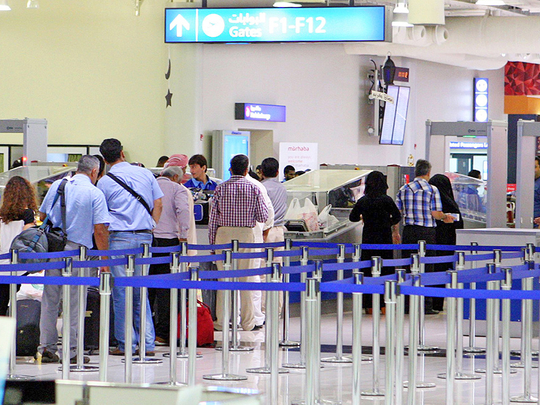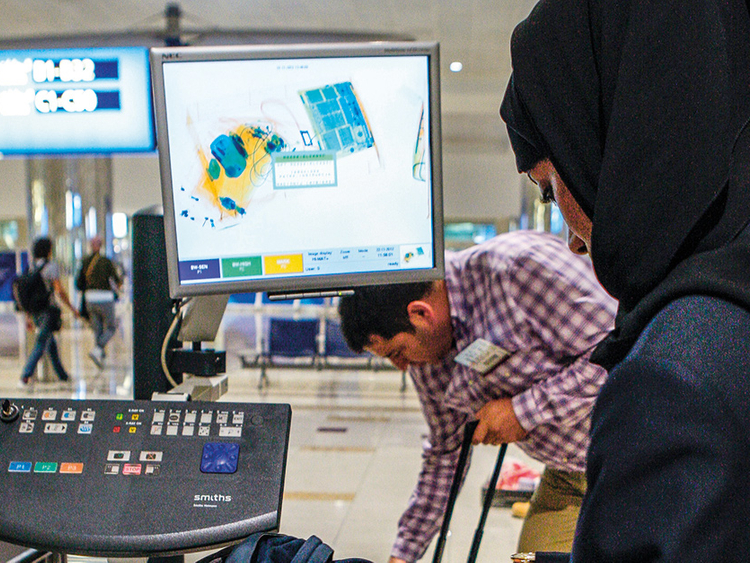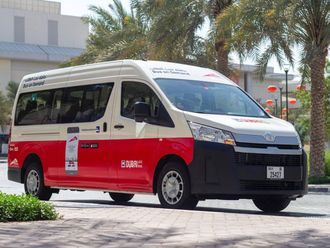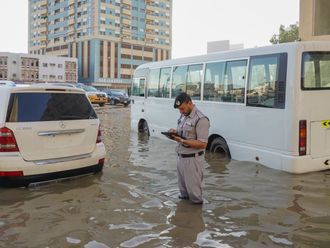
Dubai: Global aviation security experts will converge on Dubai next week seeking solutions to electronics bans on flights from Muslim-majority countries imposed by the US and UK as well as extra passenger screening measures by Australia.
The World Aviation Safety Summit on April 11-12 will explore security alternatives for airlines such as Emirates and Etihad.
It remains unclear why the UAE has been added to watchlists by the US and Australia while the UK has not imposed any restrictions on any of the country’s airlines.
The measures are in concert with reports that suggest US intelligence experts have learned that Daesh may have obtained sensitive airport security technology and used it to test ways to hide explosives in electronics.
In response to the US in-cabin electronics ban, Tim Clark, president of Emirates airline, said in a statement: “Our aim is to ensure compliance with the new rules, while minimising disruption to passenger flow and impact on customer experience. Our new complimentary service enables passengers, particularly those flying for business, to have the flexibility to use their devices until the last possible moment.”
Emirates passengers can use laptops and tablet devices on the first part of their journeys to the US and also during transit in Dubai, the airline said, then check in their laptops, tablets, and other banned electronic devices to security staff at the gate just before boarding their US-bound flight.
“Once on board they can still stay connected on their mobile phones. Our historical data shows that on Emirates’ US flights, 90 per cent of passengers using our onboard mobile and Wi-Fi connectivity services do so via their smart phones. Only six per cent connect via their laptops, and 4 per cent via their tablets,” Clark said.
Etihad, as well, is countering the electronics ban on US flights by offering loaner in-cabin Ipads to first-class and business passengers at no cost plus vouchers for free internet service.
Etihad on Monday said in a statement that bookings were healthy despite the restrictions.
On the ban, the US Homeland Security said in an earlier statement that “evaluated intelligence indicates that terrorist groups continue to target commercial aviation and are aggressively pursuing innovative methods to undertake their attacks, to include smuggling explosive devices in various consumer items”.
The International Air Transport Association (IATA) also called on governments to seek new alternatives to the bans and screening.
The trade body questioned why airports such as those in the UAE are on the American electronics ban list, but not on the UK list.
“With the measures now in place, our passengers and member airlines are asking valid questions. Why don’t the US and the UK have a common list of airports?” queried Alexandre de Juniac, IATA’s director-general and CEO, in a statement. “The current measures are not an acceptable long-term solution to whatever threat they are trying to mitigate. Even in the short term it is difficult to understand their effectiveness. And the commercial distortions they create are severe. We call on governments to work with the industry to find a way to keep flying secure without separating passengers from their personal electronics.”
Darren Chester, Australia’s Transport Minister, said on Sunday that the new security measures will come into effect from April 6.
“In response to national security advice the Federal Government has made precautionary changes and instructed airlines to implement new protocols from next week,” Chester said.
Tighter restriction for air passengers
US measures
Effective March 25.
The in-cabin ban does not permit any electronic device larger than a normal sized smartphone including e-readers, laptops, tablets as well as DVD players, all of which must be stowed in the hold.
The ban is in place for all flights to the US from the UAE, Kuwait, Egypt, Turkey, Saudi Arabia, Jordan, and Qatar.
IATA calculations show that this ban will impact about 350 scheduled flights a week, equivalent to about 2 per cent of total international flights to the US.
UK measures
Announced March 21.
The in-cabin ban does not permit any electronic device larger than a normal sized smartphone, specifically, any device exceeding 16cm (length), 93cm (width) and 1.5cm (depth).
The ban is in place for all flights to the UK from Egypt, Tunisia, Saudi Arabia, Lebanon, Turkey and Jordan.
IATA calculations show that this ban will “impact about 393 scheduled passenger flights per week, equivalent to about 2.7 per cent of the total international scheduled passenger flights to the UK.
Australia measures
Effective April 6.
Passengers and luggage will be randomly screened for explosives according to the new rules imposed by Australia.
The new screening is in place for all flights to Australia from Doha, Qatar and from Abu Dhabi and Dubai in the UAE.
Emirates operates 11 flights a day to Australi while Etihad flies two daily routes to Australia.
What travellers in Dubai say about Australia’s security rules
“I am interested to know why they are imposing such rules. I read in the newspaper there was some sort of bomb threat. I think it will be interesting to experience the added security.”
Nikka Valencia, Filipina
“It shouldn’t happen. I think it’s unfair. I’ve been to the US and had the same issue and because of that experience I’m never going again. I know friends of mine who are moving there, [to Australia], but their families are not going to visit them because of all this hassle.”
Ali Mirza, Pakistani
“It’s fine if it’s going to secure the country, but if it’s related to religion, then it is a very tricky thing. I think it’s very ignorant to kind of pinpoint that [terror threats] come from the Middle East. It should be an overall increase in security, but it should not be specific to the Middle East.”
Zaheeda, Indian
“I think it’s a valid thing to do, but if you do, do it everywhere so that it’s consistent at different airports. For example, when you’re flying from Dusseldorf, it’s just like flying from here to Australia, or into or out of America.”
Thomas Schmidt, German
— Compiled by Paul Crompton, Staff Reporter
New measures on drones to be discussed
Drone interference at major airports costing millions of dollars in operational and passenger delays will be examined at the World Aviation Summit April 11-12 in Dubai.
Mohammad Abdullah Ahli, director-general at the Dubai Civil Aviation Authority, said in a statement on Monday: “It is important that we continue to educate our citizens on the rules around drones to ensure maximum safety in our airspace. Regulations and procedures are helping to minimise the dangers and we are working with industry stakeholders to continue addressing the challenges that drones bring. The World Aviation Safety Summit will be the perfect platform to propose new measures and agree on improved ways of keeping airspaces safe and secure.”
Ahli was speaking to a growing global problem which also prompted Dubai International Airport to briefly suspend operations three times in 2016 when a drone intruded into high-security airspace.
Dozens of flights were delayed in and out of Dubai as a result.
Drones are prohibited within 5km of UAE airports.













